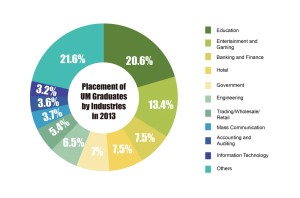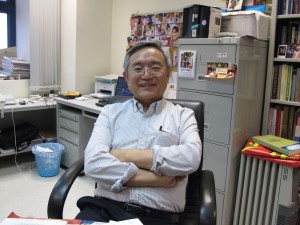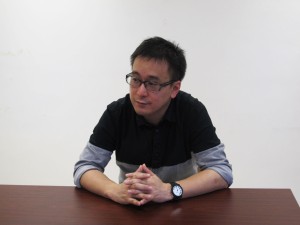By Ashley Hong, Emily Wong, Maria Micaela Lao Estorninho, Yvonne Wong
While depressing stories of people out of a job lining up for food coupons or even committing suicide can be seen in the news media in some countries, the unemployment rate in Macao is one of the lowest in the world. However, are people in Macao really doing the jobs that they dream of?
In Macao, the gaming industry dominates its economy, providing local people with abundant job opportunities. For most people in Macao, it is not difficult to get a job. Instead, people now focus more on salaries, welfare and benefits, company’s reputation and prospects during job hunting. Moreover, people tend to engage in the field of hotel and resort industry, which leads to a limited development in other industries.
An online survey has been conducted among 108 local citizens aged 18 or above recently, aiming to investigate young people in Macao, especially fresh graduates, of their employment intentions and expectations, as well as the difficulties that they are actually facing when finding jobs.
According to the survey, about 76.9% of the respondents plan to enter the work force right after graduation, with the majority planning to engage in the field of hotels or retail industries, while only 15.7% of them chose to further continue their study. Moreover, the social acceptance for young people engaging in the gaming industry is at a high level, the survey shows that more than 50% of the people stayed neutral or expressed that they are willing to enter the gaming industry. However, people tend to think that university graduates who work as dealers for fast money is “unacceptable”.
The survey also illustrates that more than half of the people are in doubt whether they would be able to choose jobs that are related to their areas of study in the future, which reveals that there is a lack of career choices in Macao. Furthermore, more than half of the people seldom or never change their jobs. Also, from the survey, there are 57.4% of them who have thought of starting up their own business, while others do not have such ideas mainly because of a lack of confidence and being afraid to take a risk.
In order to have a clearer and more in-depth picture of Macao’s employment prospect and the impact of the dominating gaming industry on young people’s job choices, we interviewed four specialists in related fields to share some of their thoughts and opinions on the issue.
“It’s a huge problem that Macao’s industry is excessively unitary,” said Agnes Lam, assistant professor from the Department of Communication, University of Macau (UM). “When I first became a journalist around the early 90s, the tax revenue from gaming sector only occupied about 30% of the government’s revenue, but now it has increased to almost 80%!”
Lam expressed that the main source of the government’s revenue reflects that Macao’s industrial development is too unitary. “The colossal gaming industry takes up most of the human resources and capital. For example, fresh graduates or talents will probably choose to engage in the gaming industry which can provide a more satisfied and higher salary comparing to other small firms. Therefore it is tough for other industries to develop because of the lack of qualified and talented people,” indicated Lam.
Moreover, the cost of living in Macao is rapidly increasing. It has become increasingly difficult for people to set up their own business with rising rental fees. “10 years ago, young people could afford to pay for their rent, which was around MOP1,500. But nowadays, unless they have MOP150,000, don’t even bother to think about it,” said Lam. The huge amount of start-up cost and risk-ridden situation for survival for small and medium-sized enterprises have left young people with no other choices.
“I encourage young people to have entrepreneurship. Still, it is really difficult to set up business in the current prospect. I suggest young people to be more flexible and make use of different methods and channels such as the Internet to break through the difficulties of expensive rental and limited human resources,” commented Lam. “I think the venture capital fund is good, but I doubt its effectiveness. It’d be better if the government could do more to help, like providing vacant venues.” Lam explained that the fund has its limitations under the expensive rental situation.
However, Zhidong Hao, professor from the Sociology Department of UM holds a different opinion. “I’m afraid the general public is holding a wrong conception. People way too often complain that the government is not doing enough for them. But in my opinion, even though the Macao government is rich, people shouldn’t rely too much on the government for subsidy, it is their own responsibility. For example, the venture capital fund, I think MOP300,000 is already way too much! What more do they want?”
Hao said that what the government really should do is to take care of the well-being of young people, both physically and psychologically. “With the over-dominating gaming industry, young people could easily go astray. They could pick up the wrong value set and become really materialized,” Hao noted. He also advised young people to be realistic and not to be over-ambitious when looking for a job. “Everybody has an ambition to move up in society, but attitude is very important.”
Francesca Tam, the functional head of UM Future Studies and Placement Centre, resonated. “Holding the right attitude is very important, it’s a life-long learning process that we all need to master.” Tam encouraged young people not to place money as their priority when looking for a job. She pointed out that changing jobs too often is not such a good idea as it could have a negative effect on their credibility.

Francesca Tam, functional head of Future Studies and Placement Centre, Student Counseling and Development Section of UM Student Affairs Office.
Tam believed that Macao’s employment prospect is rather optimistic, with the unemployment rate falling to an astounding 1.7% recently. “It’s not hard to get a job in Macao, but finding a suitable job is,” Tam expressed. In Macao, getting a “dream” job is not that easy, especially for young people. Most people would blame it on the over-dominating gaming industry, but Tam presumed that the gaming industry is indeed invigorating and bringing along the development of other industries in Macao.
“What young people really need is a good career planning to explore their own potentials,” Tam recounted. “Personally speaking, I do support young people to start up their own business, although it would be more favorable if they start out working for a couple of years first, to pick up essential skills in learning how a business is run.”
Pan Lei, senior instructor of the UM’s Department of Communication, has a say on the concerned issue as well. He believes that Macao’s youth are not progressive enough in pursuing excellence. “Nowadays, jobs find people, and not the other way round. People don’t feel the need for self-improvement as it is easy to find jobs,” said Lei.
Lei remarked that Macao is currently earning “fast and easy” money. In order to build a prosperous society, Macao needs to diversify its revenue source, so that other industries could bloom. “Macao is still on a long journey from developing the cultural and creativity industries,” Lei added. “People focus too much on money. Youth are getting used to the consumerist lifestyle. Instead of making a living, a majority of them are earning money for material comfort,” Lei expressed.
Lei suggested that “self-exploration” is most important for young people when they first enter the work force. “Don’t just look at the money. Try out for other possibilities, search for your own interests, explore your ability and talent, and find out what is most suitable for you,” Lei concluded.




